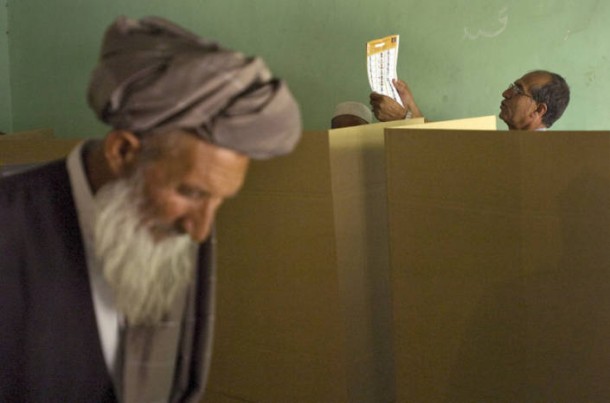AFGHANISTAN. The first round of presidential elections was held on April 5, 2014, in Afghanistan and experienced for this country a high turnout – almost 60%. As a result, international media hastened to declare that the first round elections demonstrated a certain level of unity of the Afghan population and also proved the success of the national security agencies to deal effectively with the threat of the Taliban. The preliminary official results will be announced on April 24, but there is unanimous opinion that none of the candidates received the required 50% plus 1 vote to be directly elected. This means that the country will see the second round of elections, scheduled on May 28.
Two of “big three” (Ghani, Abdullah, Rassoul) are expected to eventually clash in the second round of electoral fight. All three have repeatedly shown support to the treaty on security between Kabul and Washington.
These three candidates are:
- Zalmai Rassoul, ethnic Pashtun and a friend of the current president formed part of ministerial cabinet as a Minister of foreign Affairs (2010-2013). The noteworthy fact about Rassoul is his key participation in the process of establishment of national unity after US military campaign to oust the Taliban.
- Ashraf Ghani Ahmadzai, ethnic Pashtun from an influential clan. He is considered as the Western backed candidate, who worked in World Bank and served as Finance Minister of Afghanistan (2002-2004).
- Abdullah Abdullah, ethnic Tajik (some sources claim his half-Pashtun and half-Tajik origin), who was former Minister of Foreign affairs (2001-2005). Abdullah was the main opposition leader, and adversary in the previous presidential elections 2009 when he accused government of rigging the results of elections. During the civil war after the withdrawal of soviet troops from Afghanistan was a close ally of Ahmad Shah Massoud, the head of the Northern Alliance militias battled the Taliban.
None of them can represent a “compromise” figure as all three figures said above have regional and clan basis of support and de-facto hardly will becomes president for the whole Afghanistan. Tajiks, Uzbeks and other minorities will not be satisfied with the Pashtun president (Ghani, Rassoul). Pashtun population, in turn, will never be pleased with the president from the North (Abdullah). This is why any of them seems improbable to reunify the “failed” nation.
Analyzing the first round elections, it is important to note that before the elections, predictions for election day were dire. The main unexpected feature of Afghanistan’s elections was its security. The armed terrorist Islamic insurgents did not manage to disrupt the vote. Acts were limited to small-scale skirmishes. The peaceful first round of elections underscored the professional success of the afghan security forces, which was presented as a political achievement of national government and western coalition that succeeded to form and train the Afghan army and police.
The demonstration of effectiveness of the Afghan security forces on the electoral date is the best advertisement for the treaty on security with the US strategic partnership assuring further presence of large contingent of American military on the Afghan territory. The new Afghan president must sign this agreement. Now supporters of the treaty have real arguments for the continuation of cooperation with the Western alliance especially when the Afghan “clan” system-mentality, not destroyed yet, is affecting the unity of the national army destined to protect population. Actually Afghan soldiers continue to divide each other on national, regional and other basis.
At the same time, these elections may become the largest post-2001 political defeat of the Taliban in Afghanistan. Afghans’ vote demonstrates that there are many who are against those (Taliban and other armed insurgents) who demanded to boycott presidential elections. In fact, it gives an impression that the Taliban has no sufficient strength to gain power and lacks popularity among the local population.
In general, the presidential campaign was far from to be rife of live debates among the electoral adversaries. In fact, there was no public debate and discussions among candidates and their supporters on the “hot” topics disclosing main dilemmas hampering progress of the Afghan state. The primary questions of modern Afghanistan – the foreign military presence, dialogue with the “Taliban” and the fight against drug cultivation were not publicly discussed. They are indeed the core issues to deal with for the new authorities along with rampant corruption as they are directly related to the “exsiccated” stance of Afghanistan’s weak economy.
The other main characteristic of the first round of elections is the “media advocacy campaign” bursting just after the closure of polls. Some analysts have drawn their attention at the way the media campaigns were used as resource with the aim to shape public opinion and put pressure on the authorities and the candidates. The provocative information raid with clear political purposes was apparently caused by the willingness to “dispose off” and put pressure on various candidates declaring unofficial preliminary results, based on some opinion polls, which favour Ghani and Abdullah.
If this is so, as both of these candidates have almost the same level of support among the population, the second round promises to be fervent.

